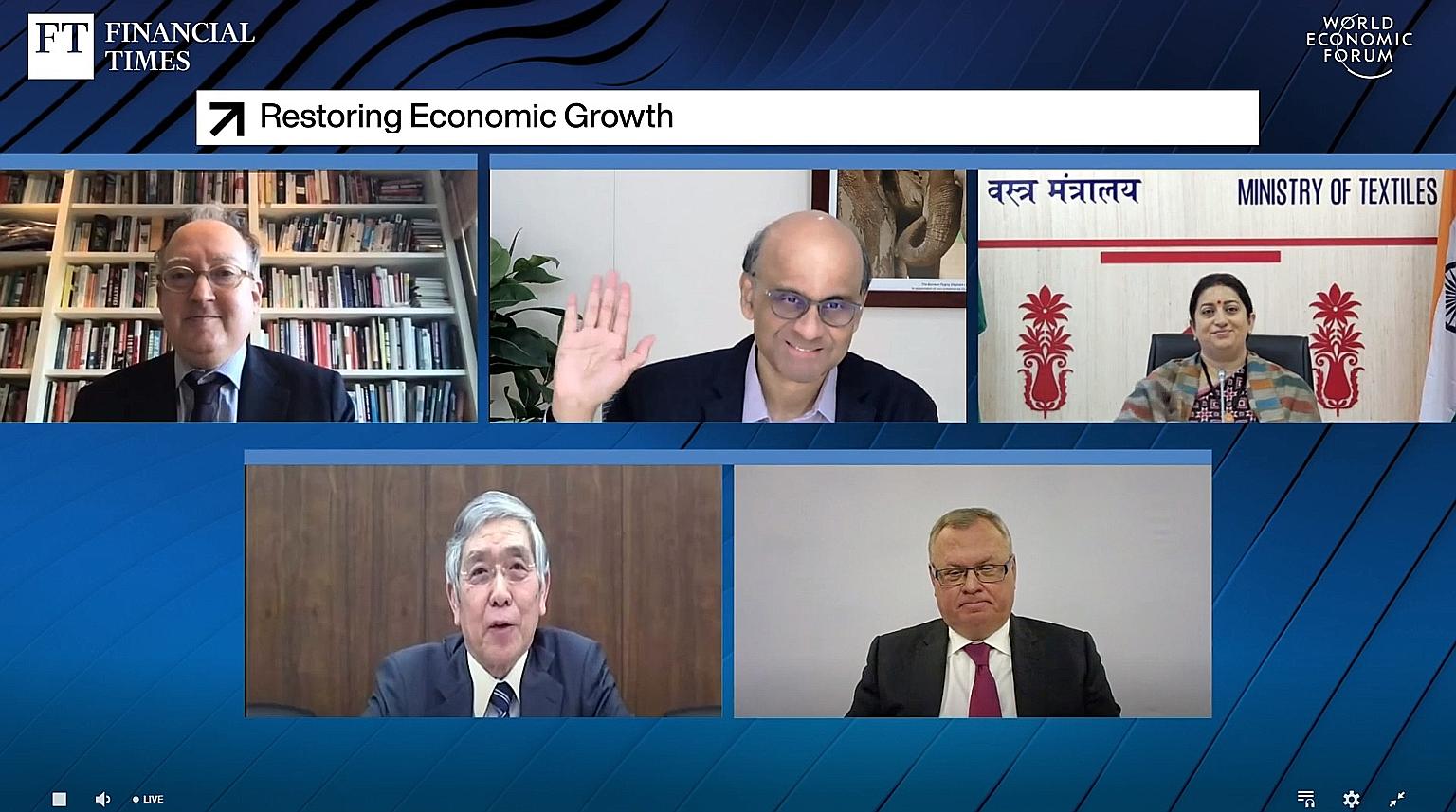Tharman: Global recovery uncertain, so govts must be ready for setbacks
Countries must ensure policies are in place to protect weakest citizens amid pandemic
Sign up now: Get ST's newsletters delivered to your inbox

Clockwise, from top left: Financial Times associate editor Gideon Rachman, who was the moderator of a panel that comprised Senior Minister Tharman Shanmugaratnam, India's Minister of Women and Child Development and Textiles Smriti Irani, VTB Bank president and chairman Andrey Kostin, and Bank of Japan governor Haruhiko Kuroda.
PHOTO: WEF
Until the roll-out of Covid-19 vaccines is widespread and the world achieves herd immunity, global economic recovery will be uncertain, Senior Minister Tharman Shanmugaratnam said.
Governments must therefore prepare for a range of possibilities, be ready to deal with setbacks, and ensure that policies are in place to protect their weakest citizens.
Mr Tharman, who is also Coordinating Minister for Social Policies, made these points yesterday, noting that in the face of great uncertainty last year, governments around the world implemented unprecedented monetary and fiscal policies to avoid the possible collapse of economies and public morale.
"This year the gamut of possible outcomes is not as wide, but it's still very wide," he said.
"No one can pretend to project what global growth or even national growth will look like, because so much depends on the virus."
The key uncertainty is when the world will achieve herd immunity, he said, as there is still a large part of the developing world where vaccine distribution will be "nowhere where we would like it to be".
There are also questions about the extent of vaccine uptake even in advanced countries, which will limit their ability to achieve herd immunity.
"We're quite far away from being able to talk about the end of this crisis. There's light at the end of the tunnel, but it's still a long tunnel ahead," he added.
"So think in terms of uncertainty, be prepared for further setbacks, and ensure that public policy is still there to protect the weakest."
He was speaking on the topic "Restoring economic growth" at the World Economic Forum (WEF) Davos Agenda 2021, a series of virtual sessions to discuss global issues under the theme "A crucial year to rebuild trust".
More than 1,500 business, government and civil society leaders from over 70 countries are taking part in the week-long discussions, which will feed into May's WEF special annual meeting that is scheduled to be held in Singapore.
Other panellists in the session moderated by the Financial Times associate editor Gideon Rachman included Bank of Japan governor Haruhiko Kuroda, VTB Bank president and chairman Andrey Kostin, and India's Minister of Women and Child Development and Textiles Smriti Irani.
Mr Kuroda agreed with Mr Tharman's remarks, and said that while Japan's economy picked up in the third quarter of last year, there are fears that the recent declaration of a state of emergency in parts of the country in response to a resurgence in infections will dampen recovery.
Sounding a more positive note, Ms Irani said the coronavirus has brought the world together in sharing best practices; while Mr Kostin cautioned against the possibility of a financial bubble particularly among technology companies.
"The question is how much of it is speculative, and whether it might lead to financial bubbles. We have to be very careful about managing expectations for digital growth," he said.
Mr Tharman observed that it will be a long time before travel - which is not just for leisure, but also a key part of the productive economy - gets back to normal.
And no economy can get back to normal until a large part of the developing world outside of China recovers from the crisis, he said.
He stressed that emerging economies are where the largest opportunities for growth are over the next few decades.
"So it's in everyone's interest that we first get past this crisis and invest in infrastructure and stronger international networks with the developing world, so as to create a whole new phase of growth for these economies as well as the global economy," he said.
Preparing the entire workforce for the new hybrid workplaces of the future is also critical, he said, adding that while remote work and the use of digital technologies are here to stay, it is crucial that these do not lead to greater inequality between professionals who can more easily adapt to such work, and blue-collar workers and others whose jobs are more at risk.
"Governments must work in partnership with unions, companies and training institutions to continually gear people across the workforce for the needs for the future, so we get a new phase of inclusive growth," he said.
Countries must also shore up the multilateral system and rebuild cooperative internationalism, he said.
The world, he added, is still failing to act in its mutual interests on a range of pressing global issues such as healthcare and climate change. The reactive and fragmented funding of global public goods to tackle Covid-19 is a case in point, he said.
"This is not the last pandemic or global crisis we are going to have. It is going to be far less costly to invest in multilateralism and global public goods, than having to pay the huge costs of recovering from the crises that keep recurring."

